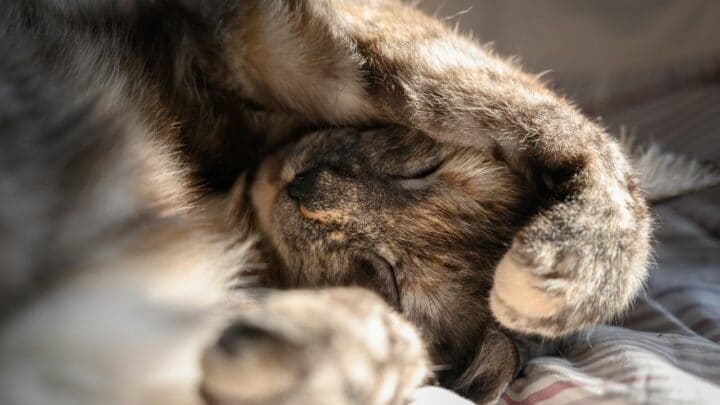Have you noticed your feline scratching and licking itself more than it normally does? Sometimes, you even see your cats grooming then biting each other.
While grooming is perfectly standard behavior for cats, anything in excess may indicate that your cat is suffering from an underlying issue.
This post will look at various reasons why your cat may be scratching her face and head more than usual.
Cat scratching her face and head
Excessive scratching in the face and head area may be a sign that your cat is itchy. Itchy skin can be caused by pests such as fleas and ear mites, allergies (dietary or environmental), or psychological factors, such as trauma, that lead to compulsive grooming.
Pests that Cause Cats to Itch
All cats scratch themselves occasionally, just as all humans do. However, when a cat starts to scratch themselves excessively, it’s usually a sign that something is making them itchy.
Often, the root cause is pests like fleas or ear mites.
We know fleas can be a big problem with domestic animals, and they don’t discriminate when it comes to where on the body they attack cats.
A flea infestation in a cat’s face and neck area may explain a sudden onset of voracious cleaning and scratching. These hard-to-reach spots can be particularly bothersome.
Similarly, ear mites can explain ear and head itchiness. These horrendous little bugs make their home inside your cat’s ears, which can lead to immense irritation, scratching, and head-shaking.
Fortunately, most pest infestations can be sorted out with topical treatments from your vet.
Allergies that May Cause Itchiness
Cats can have allergic reactions to any number of things, and often this presents as itchiness with sore, swollen skin.
For example, some cats are allergic to fleas, parasites, or lice. This results in dermatitis, which leads to excessive scratching, to the point where some cats will pull out their fur or break their skin.
Food allergies, also common in cats, most often present with itchiness in the head and neck areas specifically and may account for excessive scratching and visible irritation.
If you notice your cat is also biting their paws and tail, a food allergy might be the cause of their discomfort.
Similarly, cats can be allergic to things in their environments. This can include cleaning products, washing powder, or body products on their human.
It may also be that the air in your home is too dry for your cat, thereby drying out their skin. This is common in houses where the heat is set too high, and there is very little moisture in the air.
Luckily, most allergies can be dealt with quickly and easily. For pest allergies, your vet can provide you with the needed treatment.
For food allergies, there are dozens of quality hypoallergenic food products available that you can source in consultation with an expert.
And for environmental allergies, once the cause is determined, it’s as easy as removing that factor from the cat’s environment.
Compulsive Grooming in the Head and Neck Area
If you’ve established that your cat is not suffering from pests or allergies, it may be that they are simply in a cycle of compulsive grooming.
For cats, grooming is a comfort mechanism, and anxious cats may lick and scratch themselves more than what is strictly necessary as a way to make themselves feel okay.
In severe cases, this can lead to itchiness and fur loss, making your cat even more unhappy. You may find that they repeatedly scratch their heads and necks.
To establish if your cat is suffering from compulsive grooming, first consider if there have been any drastic changes in its environment that may be causing it stress.
If nothing has changed, and you’re sure your cat does not have a skin issue or allergy, consider taking it to the vet for a check-up. They can give you proper advice on what’s the next best step.
Other Reasons Why Cats Scratch Their Necks and Heads
Dental issues such as mouth ulcers may account for your cat’s excessive head and neck scratching as indicative of discomfort. This is often accompanied by difficulty eating.
If you suspect that your cat has an unusual problem in its mouth, take it to the vet to check.
While more prevalent in white and light-colored cats, skin tumors may also cause head and neck scratching.
Skin ulcers present as unusual lumps and bumps on the head and ears, and you should seek treatment for your cat as soon as possible.
Frequently Asked Questions about Cat Scratching Her Face and Head
What foods are cats commonly allergic to?
Most often, cats with adverse food reactions are allergic to fish, chicken, beef, or dairy products. While not much research has been performed in this regard, your vet will be able to test your cat for food allergies and help you determine what needs to be removed from its diet.
How do I stop my cat’s over-grooming?
The first step is to determine why your cat is grooming too much. A trip to the vet will help to establish the underlying cause. If it is stress-related, consider seeking a behaviorist’s help. It may also be that your cat is bored and in need of your attention.
How do I soothe itchy skin?
An itchy can is usually an unhappy cat, so to comfort them, speak to your vet about topical treatments for your cat’s skin. Brushing or bathing your cat may also give it some relief.
Conclusion
Cats are surprisingly good communicators when it comes to their overall health, and usually, strange behaviors will let us know that something is amiss.
If you notice that your cat is suddenly bothered with its head and neck, it may be that they are suffering from an issue, and they need your help.
If the behavior doesn’t stop after a day or two, opt to send your kitty to the vet for a check-up.


